Lap 111: Sponsored by Brooks Running
If there is one thing that Brooks is good at, it’s making running shoes. But if there's a second thing, it’s bringing the hype! CITIUS MAG had the pleasure of calling the Hyperion House HQ all marathon weekend – it was an inspiring, nonstop carousel of athletes and fans and we got to hear about so many people’s Boston experiences.
There were live podcasts, preview shows, watch parties, group runs, trivia, and plenty of coffee! The moment that line on Boylston was crossed, throngs of marathoners piled into the building to roars of applause and to receive a commemorative finisher’s scarf. Thank you to Brooks for supporting all of our coverage of the Boston Marathon and for celebrating the accomplishments of runners everywhere.
Is Evans Chebet the best marathoner in the world?
The 127th Boston Marathon was supposed to be The Eliud Kipchoge Show, but that would have been too predictable. Instead, the script wound up looking more like that of The Truman Show – cameras following the every move of a man who for the first time in years looked like a regular person.
Before diving deeper into the details of Monday, let’s make one thing clear: one race does not erase a legacy. Kipchoge is the greatest of all time. The difference between winning 17 of 20 career marathons rather than 18 of 20 doesn’t change or undermine that fact.
Okay. We got that out of the way. So what happened? What led to the GOAT finishing in 6th place, 2:09:23 — the slowest mark of his career?
Maybe it was the hills? That was a point of concern for pundits coming in. The majority of Kipchoge’s career accomplishments over the past 20 years came on the track or pancake flat courses. I’m not buying the hill theory. It’s just hard to believe that someone who trains in the mountains of Kenya would struggle with hills.
Maybe it’s age? After all, Father Time stops for no one and Kipchoge is now 38. Plus, in terms of wear and tear on the ol’ body, he has been running at an elite level since 2003 when he ran 12:52 to win the World Championship 5000m. A fair argument, but one I’ll counter with this: it’s only been seven months since he set the world record, going 2:01:09 in Berlin. This isn’t Interstellar – people don’t age that suddenly.
Maybe it was the missed bottle? Nope. That’s not how fueling works. Just because you miss one bottle doesn’t mean you get dropped two minutes later. In hindsight, his failing dexterity was probably hinting at what was to come, rather than causing it.
Maybe it was the race tactics? There are no rabbits or lasers in Boston, and Kipchoge got plenty of pacing help in Tokyo, Berlin, London, Chicago, and the INEOS 1:59 Challenge. Then again, there are no pacers at the Olympics… which he has won... twice. Kipchoge did run more aggressively at Boston than many would have anticipated. He was towards the front pushing the pace for much of that opening downhill. He hit 5k in 14:17 and kept his foot on the gas past the half split in 1:02:19. Perhaps a more conservative approach – you know, hiding in the pack and making it through 16 miles unscathed, something like that – would have been a more suitable strategy. But again. I’m not sold on this theory either. It’s not the craziest idea for the man who has consistently proven that he can run 26 miles faster than anyone else to try and keep things honest. And others with similar splits held on better.
Then maybe it was something else entirely? On Tuesday during a conversation with the media, Kipchoge had the opportunity to answer some questions and there was plenty of speculation about what went wrong. He pointed to a pain in his leg that he started to suffer from at mile 21. That’s marathoning, baby! (And for what it’s worth, my legs also hurt when someone else runs faster than I’m able to.)
The fact that Kipchoge losing is such a rarity that it’s viewed as some great mystery to be solved is a testament to his incredible track record.
So hear me out: maybe Eliud Kipchoge didn’t lose. Maybe Evans Chebet won?
It is scary to say this out loud, but Evans Chebet is – right now, at least – the best marathoner in the world. It seems like such a blasphemous thing to suggest, however, the facts seem to back it up. And that’s why we race – to figure out who is faster. Are we going to selectively diminish certain results because they don’t fit the narrative? Evans Chebet is also faster than Gabriel Geay, Benson Kipruto, and everyone else who ran on Monday. That’s the point.
Chebet has won six of his last seven marathons, including two in Boston, and one in New York. But Evans has also proven that he can run fast, having won Valencia in 2020 in a personal best of 2:03:00.
Head-to-head is what matters most, and although Kipchoge ran fast in Berlin, he didn’t really beat anyone of note. I suppose there are two ways of looking at a five-minute margin of victory; it was either really THAT dominant or most of the appearance fees went to one man. Tokyo was a better win as it came against Amos Kipruto (London Champ) and Tamirat Tola (World Champ), but both of those men have multiple losses on their resume the past few years, which Chebet does not.
If you can accept the premise that Chebet is now the best marathoner in the world then stop looking for other reasons why Kipchoge was beaten. The story should be that the crown was earned, not stolen.
Now the next challenge is on Adidas: how do you make Evans Chebet a household name like Nike was able to with Kipchoge? It starts with more winning.
Without that, the inspirational quotes, the monk-like lifestyle, and the stoic approach to becoming the fastest to ever do it becomes meaningless. Just because it is part of a carefully cultivated marketing and PR campaign doesn’t make it less genuine. Although, I admittedly have never liked Kipchoge more than when I watched him get frustrated with reporters. He is not happy about Monday, and it’d be foolish to suggest he won’t be back.
We knew Kipchoge wasn’t limited. It was the human part that was doubtful, until now.
Take Two: With Hellen Obiri 🎥
Only someone with Hellen Obiri’s pedigree would be disappointed with a sixth-place finish in their debut marathon. Her disappointment was justified after New York last fall, but it was really only a matter until she’d put up a performance she’d be more content with.
With no initial plans of a spring marathon, Obiri sort of controversially skipped the World Cross Country Championships to instead run the RAK Half, which she won in 1:05:05. Then after a dominant and impressive win at the NYC Half in 1:07:21 to break the course record on the new (re: harder) course, she decided to casually sign up for the Boston Marathon.
Despite the near-cliff that is the first few miles, the women’s race started out relatively pedestrian with an opening 5k of 17:49. As they eased into it, the pack came through halfway in 1:11:29 with a dozen contenders still vying for position on the wide open road. It wasn’t until a 5:08 22nd mile that fans could start factoring out the odds. As Obiri dipped below the overpass with 2 kilometers left, she went even more to the arms, and things started to really appear sewn up.
She broke the tape in 2:21:38 – 12 seconds faster than 2nd – the biggest win of an already historic career.
Obiri’s “ah, sure, I guess I’ll run Boston” buildup was a bit of a different approach than most athletes’. For most mortals who witnessed Monday’s magic and have discovered an itch to one day run Boston themselves, they’ll need to run a qualifier and secure an entry. That race will be circled on the calendar well in advance and the training would work backward. The many perks of being Hellen Obiri (beyond an exceptional aerobic capacity) include getting to forgo that process.
This is a lesson in striking when the iron is hot. When fitness is there it is best to use it rather than just letting it simmer. While every professional runner thinks that their hypothetical coaching career would look similar to the trajectory and success of Dathan Ritzenhein, not everyone would have the same veteran ability to remain so remarkably steadfast and adaptable.
When you work with a talent as capable as Hellen Obiri, sometimes you just have to stand back and as the kids say, “Let her cook…”
In partnership with UCAN
Fuel Like Emma Bates! Her 5th place finish and personal best marathon in Boston was fueled by the award-winning UCAN Edge energy gel. Edge delivers steady, long-lasting energy that's easy on the stomach and features steady-release carbs instead of sugar, so you don't get the spike and crash.
Emma used one gel every 5k during the race and uses a gel every 45-60 minutes in her training. She no longer has any of the stomach issues she used to get with sugary gels. "I’ve felt so much better throughout the runs with UCAN compared to taking other gels, where I would feel this burst of energy, but then it would be so short-lived," says Emma.
Get 6 FREE samples of this game-changing energy in a variety of flavors for just the cost of shipping!
Team America BOSS 🇺🇸
There are some KPIs (that’s “key performance indicators,” to you readers who aren’t big PowerPoint users) fans can use to measure the barometer of an athlete’s success. A fast personal best or some major victories are easy. Consistent success that doesn’t come with a sizzling time can be tougher to chart.
The Boston Marathon course may undulate, but Emma Bates and Scott Fauble have proven themselves to be rock-solid models of consistency there. It isn’t the sexiest metric and can be difficult to quantify, but showing up every time counts.
Ahead of the race, there was a debate about the merits of knowing the course – 26 miles is 26 miles, right? But there has to be a comfort in knowing where your body has to go next as you pass each mile marker, and a confidence that comes with knowing you’ve done it before, and done it very well.
The battle for the honor of top American in the field was a result of two differing strategies. While Fauble’s first half of 1:03:59 sounds reasonably aggressive in comparison to Conner Mantz, it appeared quite reasonable. In every race, we all have a Fauble on one shoulder and a Mantz on the other. It’s the battle between the id and superego – who do you listen to? We love a fearless king who races with the intention of beating the 2:03 guys. That’s the guy high school kids will fawn over and emulate. But Fauble is your coach’s favorite runner. And that’s why he finished in seventh for the third time at Boston and is once again the top American.
On the women’s side, it was a gutsy push from the front for Bates who spent the majority of the race on-camera as she went toe-to-toe against the strongest in the world for over 24 miles. Her fifth-place finish in 2:22:10 is a personal best and makes her eight-for-eight in getting on base in all career at-bats. Eighth place in New York remains her highest (lowest?) finish ever.
With that in mind, I’d like to revise my all-too-early predictions for the Olympic Trials. There simply are not three American women who can beat Emma Bates right now. (And no, I have not yet worked out whose spot she is taking.) How incredibly brave of me to admit that I made a mistake!
In her post-race interview, the idea of going for the American record was tossed around as an area of interest. My unsolicited armchair quarterback advice is that time is only worth chasing if it helps in the preparation for Paris. Because Bates may be ready for something cooler than just running fast – I’m talking medals, baby!
Queen of the lap — Britton Wilson👑
Most fans have only ever known the version of Britton Wilson that is dominating the NCAA in an Arkansas kit. That’s because a 58 second 400m hurdler doesn’t get the same amount of attention, which is how fast she was running two years ago while at Tennessee. In fact, her personal best was two years old at that point – Wilson had actually run 56.36 to win USATF Juniors in 2019. (Track and Field News)
This year Wilson opened up her season 1.4 seconds faster than last year, running 53.23 to win the Tom Jones Memorial. Then the next day in the flat 400m, she proved that it wasn’t the altitude in Albuquerque when she set the American Record of 49.48. This time it was 49.51 to break Athing Mu’s outdoor collegiate record.
Noah is right! But what he’s saying applies outside of America, too. Let’s quickly remind everyone of the podium from last year’s World Championship final, which featured zero Americans:
Shaunae Miller-Uibo - 49.11 SB
Marileidy Paulino - 49.60 (48.99 SB)
Sada Williams - 49.75 SB
Maybe it is because Shaunae is missing this year with a child on the way, but it does feel like this year’s 400m at Worlds is wide open. But let’s not mistake it being open with being weak, because it is not! In 2022, there were 9 women who dipped below 50 seconds. That did not include Wilson, McLaughlin-Levrone, or Mu. In 2021, there were 12 women below that barrier. There are 5 on average most years. The last two are the deepest in history.
To Noah’s point, no one is dominating and that’s partially because Sydney, Britton, Femke, and Athing have their collective focus on other events. Is it possible to do both? Sort of… it would require six laps in five days, with the 400mH heats and 400m semi-finals a bit over two hours apart. For Athing, there would be eleven hours to recover from the 800m heats before running the 400m final. Having jogged 2:01 in multiple opening rounds before, it could be a nice warm-up.
But I’m not holding out hope for one of these stars to attempt the double. (Selfishly, I’d love to see it! It would be great for the sport for fans to get the chance to watch McLaughlin-Levrone or Mu or Wilson or Bol race more often.) So I guess we’ll just have to hope that from the ranks of 49.X women currently focusing solely on the 400, one of them makes the jump and reaches the same superstar status. The power is yours!
Three laps to a mile 🔁🔁🔁
I have no idea how fast Hobbs Kessler or Krissy Gear ran to win the B.A.A. road mile and am making a point of not looking it up.
They weren’t running this race to notch a fast result, and fans weren’t necessarily looking for one either! On a three-loop course around a bustling, imperfectly paved city block, some of America’s top milers exchanged tactical blows en route to times that I’m assuming might not win a high school state title on the track..
Tactically speaking, there was no room for error – those 12 90º angles are a real equalizer – and with time out the window essentially from the start, the only thing that mattered was getting the mouth-open, arms-in-the-air celebration pic.
Since it’s essentially an exhibition race meant to draw in fans from the marathon hubbub surrounding it, and winning the only goal, it’s the ultimate soft launch of an outdoor season.
Who was second? I’m not asking you who was second. Hobbs and Krissy were first.
Mano a Mano 🇮🇹🇺🇸
It has been two years since Marcell Jacobs and Fred Kerley last faced off, in the Olympic 100m final. We remember how that went. But things have changed since then. Jacobs has battled injuries and only managed to post one race result under 10 seconds. Meanwhile, Fred has transformed himself into a World Champion with a faster personal best than the reigning Olympic champ.
A few weeks back, Fred was a guest on Anson Henry’s podcast and laughed at a question about Jacobs’ European meet that he lost. He followed it up with the suggestion that he is not a real dog.
Jacobs responded on his Instagram that “Lions do not turn around when they hear small dogs bark.” Fred appropriately shared a picture of a lion roaring.
Jacobs then posted himself out leaning Fred for the gold with the caption, “Whenever you want and wherever you want, but remember that when it mattered more it ended like this.”
Fred kept the volley going: “Keep that same energy because ducking is not what I do.” And followed it with a tweet at the Diamond League, “Make it happen I want 1v1 no one else just him. Him alone.”
That’s a tremendous amount of pressure on the World Athletics social media team! It probably was too tall a task to organize a track meet with a six-figure payday that quickly. But they made a graphic!
I love the shit talk. We need more rivalries in this sport and I hope these two genuinely don’t like each other and this isn’t Vince McMahon pulling strings backstage. As much as I hate to be a contrarian right now, this isn’t the match-up the sport needs most. That’s partially because Jacobs hasn’t shown that he is back to championship form yet.
But more so, the sizzling core of this beef is that dogs show up when it matters. There is only one way to settle that, and it’s at a global championship, not an exhibition. Now look, I know this kind of goes against what I was arguing last week about how we need to lean into the regular season more. And although I stand by that, there’s still a hierarchy!
For non-championship meets, I prefer the head-to-head battle between two guys who would not normally race, meeting in an off-event. The novelty not only makes it special, but it allows us to temporarily suspend our obsession with time and focus on the win. Hypothetically, if Fred beat Jacobs over 100m but they just hardly dip below 10 seconds, then the conversation turns to how Trayvon, Marvin, or Seville would have won had they been there. Now, a match-up between Grant Holloway and Karsten Warholm in the 200m hurdles has my attention!
Logistically, this isn’t going to happen at a Diamond League meet – they’re too set in their ways. But don’t worry. I have the solution.
Last Wednesday afternoon there were over 12,000 people watching live as Big Cat of Barstool Sports attempted an all-out mile. (Not important: he ran five laps of a 300m track in 7:24.) It is relatively rare for internet-streamed meets to have that many concurrent viewers. Back in 2021, during the Trials of Miles meet in Austin, CITIUS peaked at 11,500.
The Barstool channel that hosted this “mile” only has 115K subscribers. Now imagine if Nick Symmonds hosted an actual track meet for his audience of 1.23M subscribers who have some vague interest or at least general awareness of track and field. The key is that Symmonds is the commentator or host of the event – after all, it’s his channel.
Nick has posted dozens of quirky race videos already, which receive millions of views each. Do you know how easily he could pivot to hosting and funding a series of head-to-head competitions with top-track athletes? Between YouTube revenue and a few sponsors, the costs are covered easily. And if we are lucky, then maybe we’ll get to see how long Karsten can hang from a pull-up bar.
Rapid Fire Highlights 🔥
Belgium’s Bashir Abdi won the Rotterdam Marathon again, this time in 2:03:48 and Bahrain’s Eunice Chumba ran 2:20:31 with a minute back to second. NAZ Elite’s Futsum Zienasellassie ran a personal best and World Championship standard of 2:09:40.
Nikki Hiltz had a wild comeback to squeak by LSU’s Michaela Rose on the inside at the Brian Clay Invitational to win 1:59.03 to 1:59.08. Rose’s time is now NCAA #2 all-time behind only Athing Mu.
The B.A.A. 5K saw a 1-2 finished for Morgan Beadlescomb (13:25) and Ben Flanagan (13:26) as Ethiopia’s Mekides Abebe (15:01) held off Agnes Ngetich on the home stretch.
World Athletics golden boy Woody Kincaid had a nice profile.
Texas’ Julien Alfred is picking up right where she left off during the indoor season as she ran a nice personal best of 21.91 (+1.8). There are going to be fireworks when she finally runs a 100m!
Cooper Teare won the Brian Clay Invitational 1500 in 3:34.96, as five college kids ran 3:35-3:36. Grant Fisher ran 3:36.85 losing a shoe with 250m to go and was badly spiked in the heel with a lap to go — he posted a graphic photo to his Instagram story breaking the cardinal rule of no free feet pics.
At the Tom Jones Invitational, Texas Tech’s Terrence Jones ran 9.91 (+1.0) for 100m to tie the Bahamian national record. Noah Lyles ran 9.95 (+1.6) to win a different heat and another victory over 200m in 20.16 (-1.2).
Michael Norman’s season opener in the 100m did not go as planned as he goes 10.02 (+3.0) and is beat by Cravont Charleston who ran 9.87 for an all-conditions personal best. It has been two years since Norman’s last 100 - let’s suspend expectations for now. But when we talk about depth in the United States 100m scene, it’s amazing that Charleston, a guy who can run 9.87 in April did not make last year’s US final. But the trajectory is PROMISING.
Hey, the London Marathon is Sunday morning.
Thanks so much to Brooks for sponsoring this week’s newsletter and all of the CITIUS MAG Boston Marathon coverage!





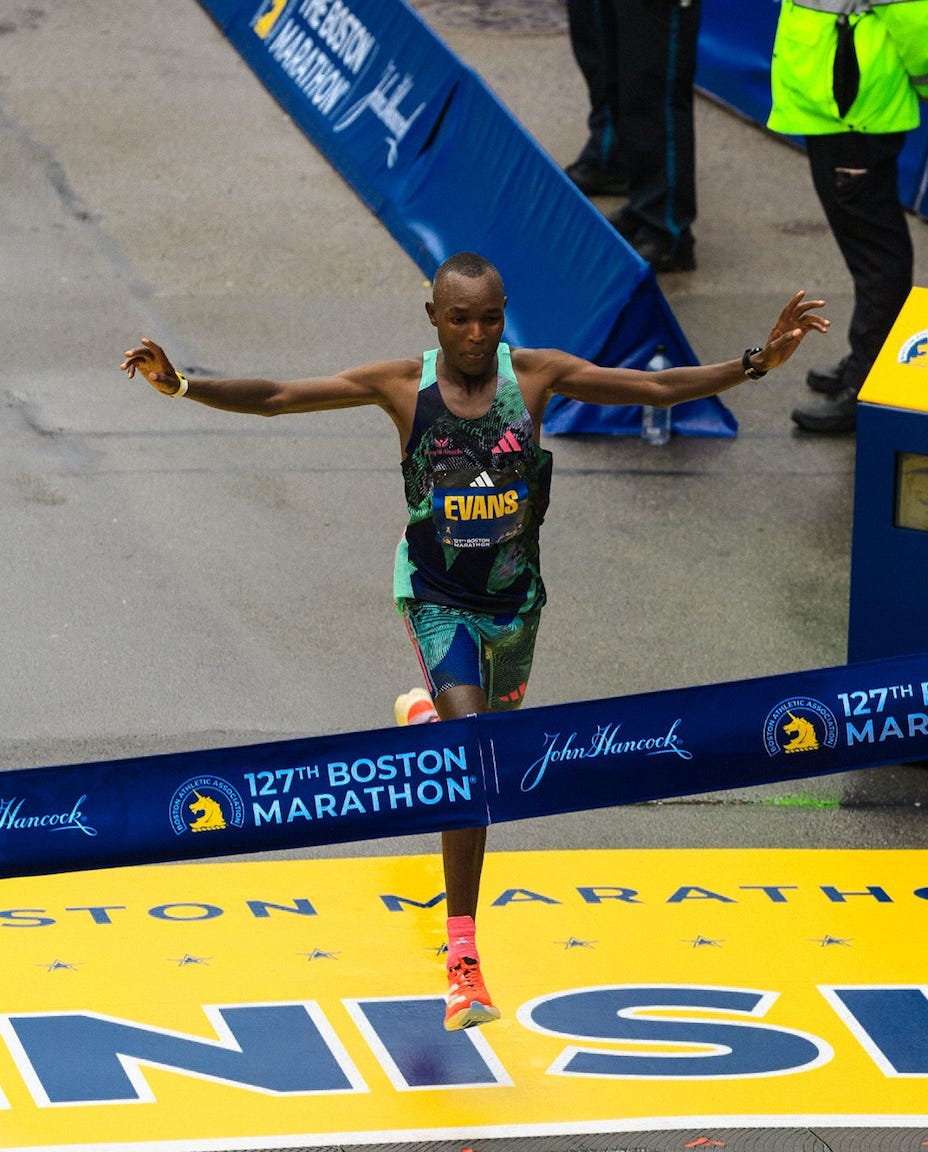
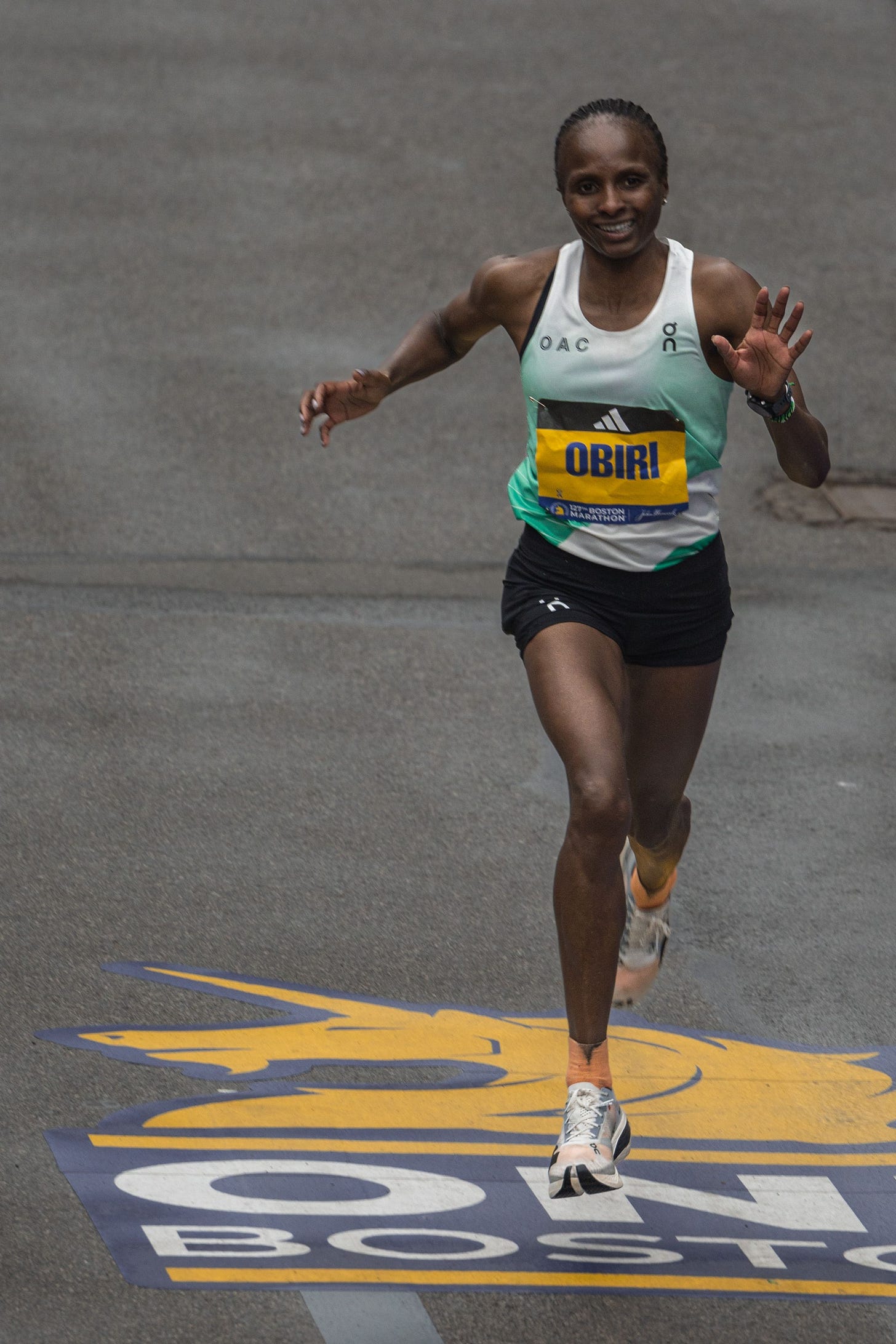

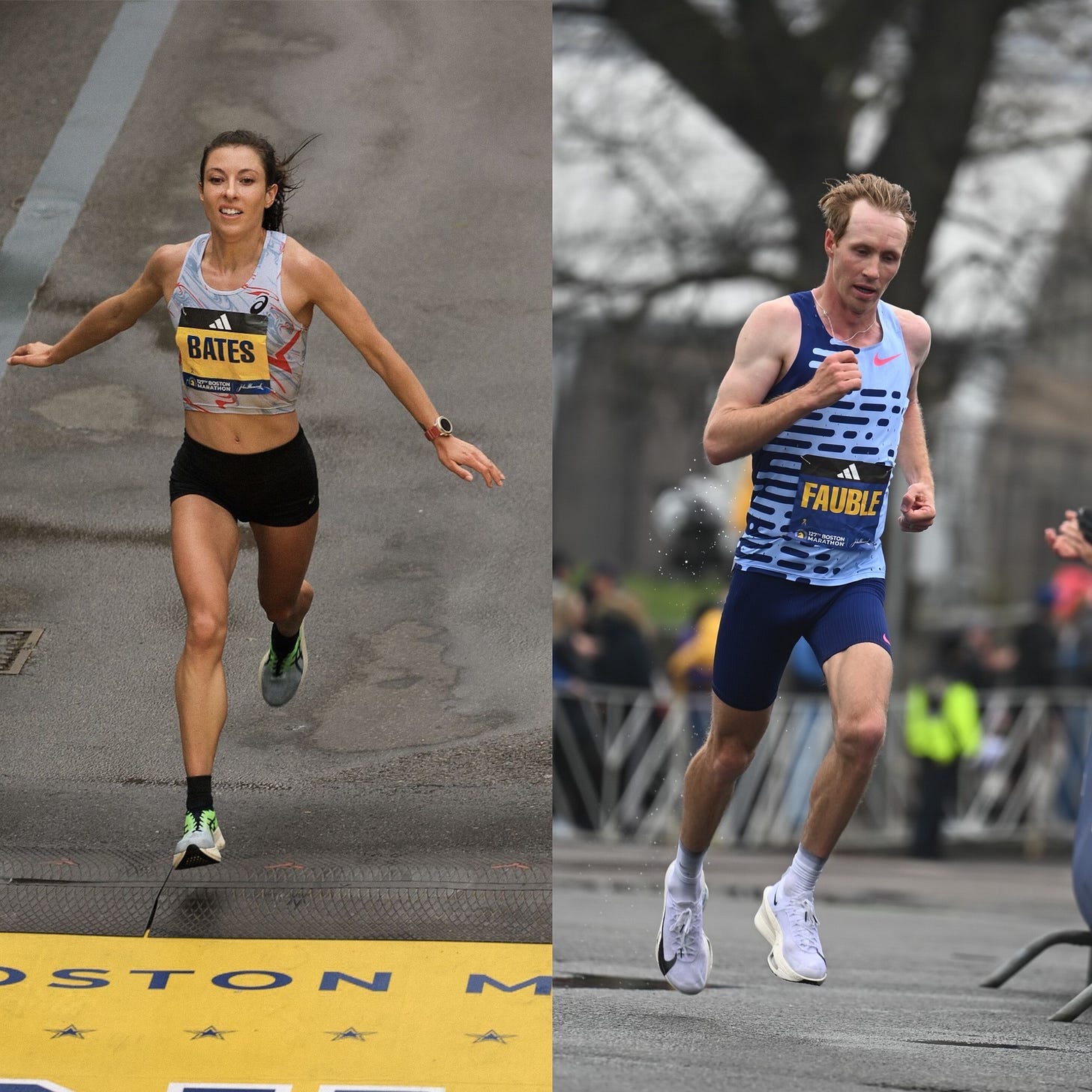


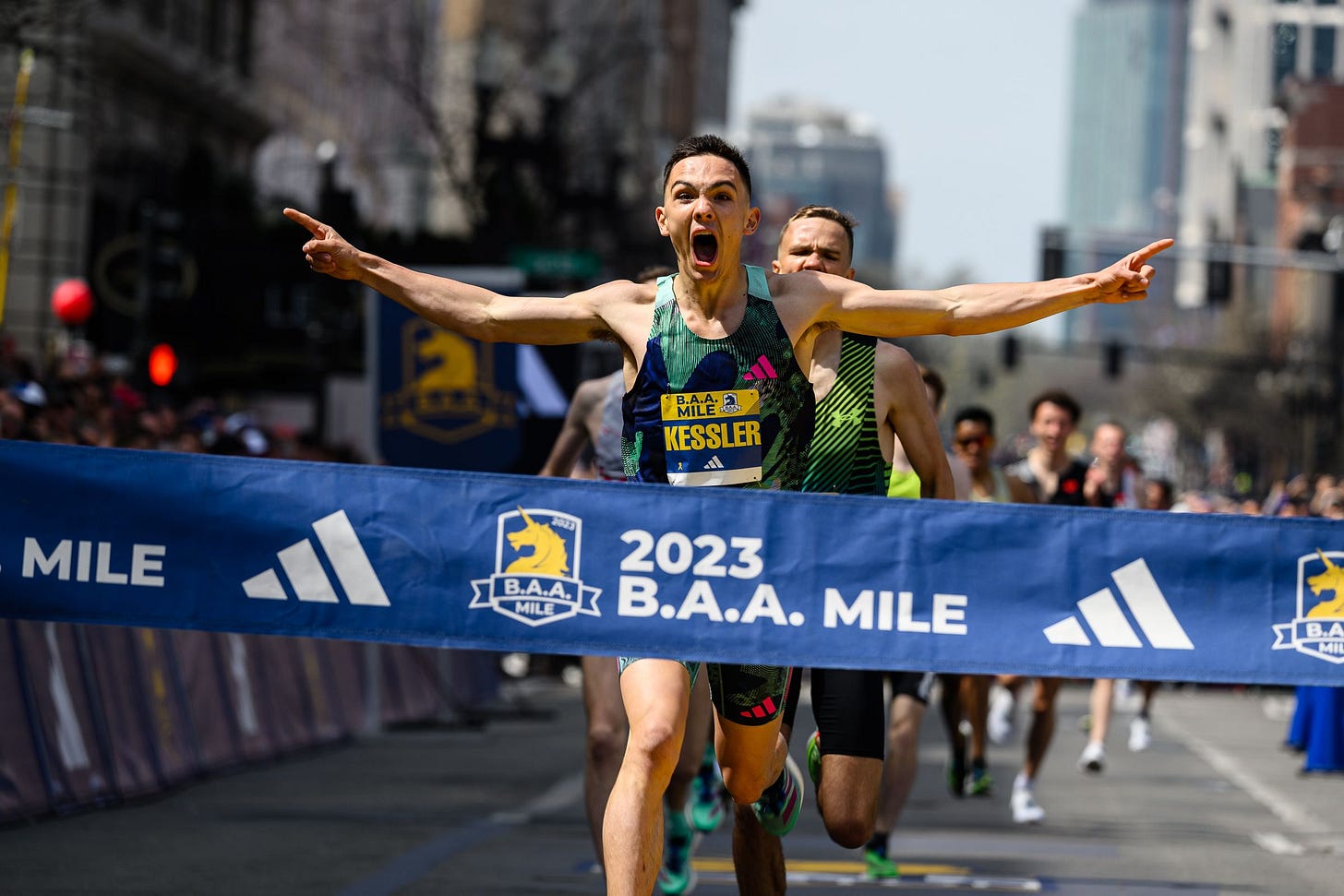
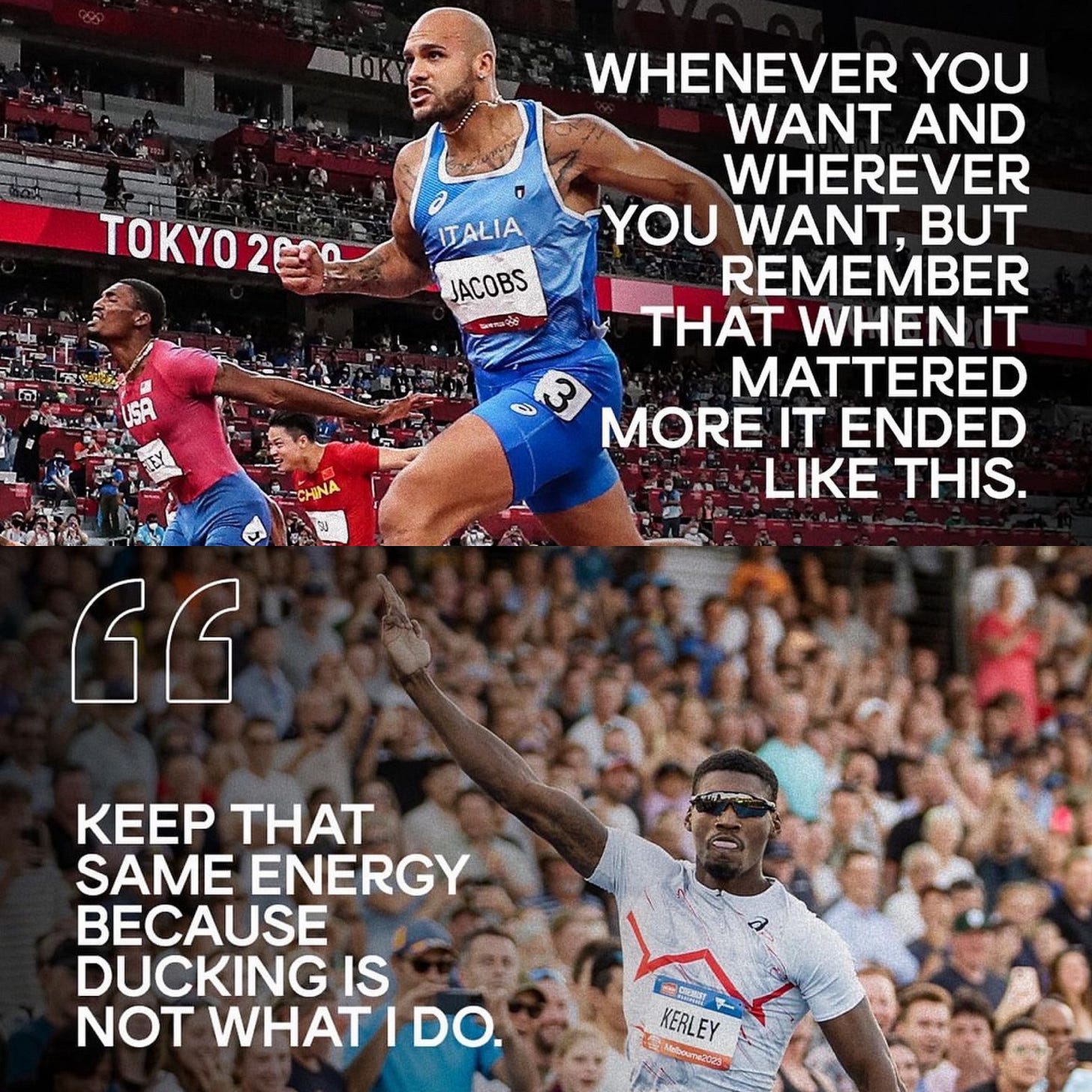
To me, the fact that Kipchoge got sixth place is what makes it seem like he lost more than Chebet won. I think it’s unlikely that there are five guys who are outright better than him and that Fauble is 20 seconds behind him on a normal day.
here's the blueprint re 1v1
https://www.imdb.com/title/tt0135729/plotsummary/?ref_=tt_ov_pl